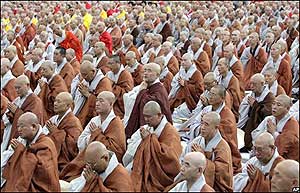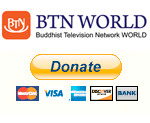
|
|
|
Home Asia Pacific North Asia S/N Korea News & Issues Tensions over Buddhism in Korea must endChosun Ilbo, Sept 10, 2008Seoul, South Korea -- At a Cabinet meeting on Tuesday, President Lee Myung-bak expressed "deep regret" over remarks and actions by some government officials that could have been interpreted as religious bias and caused concern among Buddhists.
<< South Korea: Protesting Buddhists against alleged religious bias by the government Lee said, "All Cabinet ministers, particularly the culture, sports and tourism minister, will have to thoroughly supervise and educate civil servants to prevent the recurrence of similar incidents." Lee instructed Eo Cheong-soo, the police commissioner, to visit Buddhist officials and deliver a formal apology. The expression of regret by the president came 69 days after Buddhists began demanding the ouster of public officials responsible for alleged religious biases. Buddhists have been demanding an apology from the president, a promise to prevent recurrences, the ouster of Eo and punitive measures on other public officials, plus regulations to prevent religious bias by public servants.
The other demands by Buddhists could have been resolved behind the scenes of a presidential expression of regret if officials from the government and the religious group had met face to face to talk. Regarding the demand to oust Eo, both sides have valid points. The Buddhists are right to demand his ouster since Eo has come to symbolize religious bias among public officials, while the government cannot simply fire the chief of police for allegedly being too zealous in searching the vehicle of a high-ranking Buddhist official. That was an issue that both sides could have discussed honestly to find a wide range of solutions. But ahead of the presidential apology, the government insisted that Eo would not be fired. The government ended up leaving the embers of discontent glowing among Buddhists, even though a presidential apology had resolved the worst crisis. During the mad cow disease scare, the government hastily pushed ahead with the announcement of the resumption of U.S. beef imports, causing fears to flare up after they had shown signs of calming down. The bureaucratic mentality of stubbornly pushing through decisions ended up making things more difficult, when an earnest attempt to explain the facts and to convince the public to allay health concerns could have resolved the situation. The government could have delayed the announcement of U.S. beef imports to invite housewives to Cheong Wa Dae to explain to them the facts about mad cow disease. This time, the government closed off all channels of communication with Buddhists even though it could have offered to discuss their demands over time. The Jogye Order of Buddhism said it viewed the expression of regret and pledge to prevent recurrences as more “sincere" than before, but called on the government to accept its other demands. It said it would not alter its plans to hold a rally led by a major temple in Daegu on Wednesday. The Buddhist community should also give the issue more time and seek to discuss matters with the government, now that their major demand has been met. No matter what the issue, excess creates problems. The reason why Buddhist demands carried weight was because they were not excessive. Already we are seeing other religious groups moving to oppose the passage of regulations banning religious bias. The government and Buddhists must stop troubling the public. |
 |
|
| Korean Buddhist News from BTN (Korean Language) |
|
 |
|
|
Please help keep the Buddhist Channel going |
|
| Point
your feed reader to this location |
|




